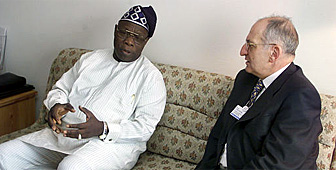Couchepin delivers cheque in Nigeria

The Swiss economics minister, Pascal Couchepin, has arrived in the Nigerian capital, Abuja, where he handed over a cheque worth SFr100,000 to the state of Nasarawa. The funds, provided by the Swiss Agency for Development and Cooperation (Deza), are to help local communities to build wells.
Couchepin, who signed the cheque at a ceremony attended by Nasarawa’s governor, said the project was “of importance”.
The Nigerian state of Nasarawa, with a population of 3.2 million, was the scene of ethnic unrest in 1998, which forced thousands of people to flee their homes.
After the event, Couchepin and his business delegation visited a traditional village and pottery-making facility near Abuja. On Monday, the economics minister is scheduled to meet the Nigerian president, Olusegun Obasanjo.
The meeting between Couchepin and Obasanjo will bring the Swiss delegation’s five-day official visit of Benin and Nigeria to an end.
Nigeria, which is rich in oil and Africa’s most populous country with 120 million inhabitants, offers many business opportunities to Swiss industry – well at least in theory.
In practice, the picture is less rosy. Frustrated by the mismanagement of the economy by successive military regimes, many Swiss enterprises have sold their Nigerian concerns, which had grown to considerable size during the oil boom of the 1970s.
Nigeria wants to reverse that trend. The country, which was ruled by military juntas for 30 of the 41 years since it gained independence from Britain, has enjoyed a rare two years of civilian government since voters elected Obasanjo, a former general and military ruler, in May 1999.
Today, Swiss foreign direct investment (FDI) in Nigeria stands at SFr30 million ($16.8 million) – a fraction of what Swiss companies have invested in countries such as South Africa (SFr1,2 billion) and Brazil (SFr5 billion).
Expectations are high in Nigeria – especially since Switzerland responded quickly to the new government’s demand in 1999 and froze the Swiss bank accounts of a former dictator, General Sani Abacha, worth SFr1,14 billion.
Unlike direct investment, Swiss trade with Nigeria has seen something of an upswing, especially since the resumption of civilian rule. Imports from Switzerland to Nigeria almost doubled within a year to reach SFr600 million in 2000, although exports remained more or less constant at around SFr90 million.
However, 99.9 per cent of imports are in crude oil, Nigeria’s main foreign exchange earner. Nigeria currently is Switzerland’s second most important supplier of oil.
Beyond oil, Switzerland’s most visible commercial presence in Nigeria is Nestlé, a producer of food and dairy products. The company expanded its investments after the Obasanjo government scrapped a decree limiting the repatriation of profits.
Most of the 50 Swiss enterprises which have investments in Nigeria are engaged in the chemical, electrical and construction sectors, and provide employment for roughly 6,000 workers.
swissinfo with agencies

In compliance with the JTI standards
More: SWI swissinfo.ch certified by the Journalism Trust Initiative









You can find an overview of ongoing debates with our journalists here . Please join us!
If you want to start a conversation about a topic raised in this article or want to report factual errors, email us at english@swissinfo.ch.